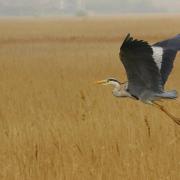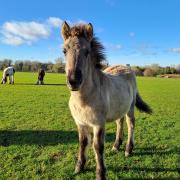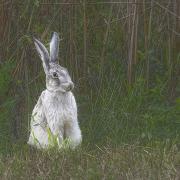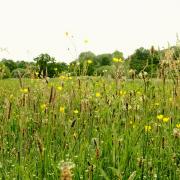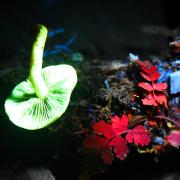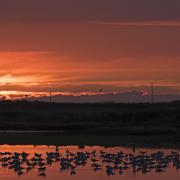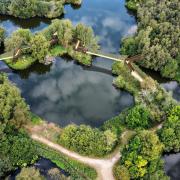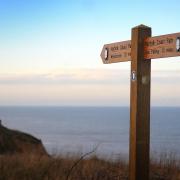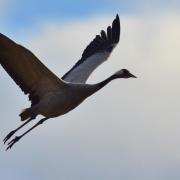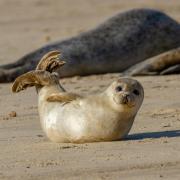Rescue seals at East Winch Wildlife Centre
Sealed with love
From tiny bats to large seals, thousands of animals pass through the doors of East Winch Wildlife Centre every year, and for many it is the difference between life and death, writes Rachel Buller.
Sitting inconspicuously on the edge of a rural Norfolk village, it is easy to miss the RSPCA’s Wildlife Centre.
Yet behind the unremarkable exterior, amazing things are happening every single day.
This is a centre teeming with injured or sick animals and birds, where the door is never closed to new admissions,and where staff go to extraordinary lengths to try to save, protect and rehabilitate a growing list of species.
"We are not a sanctuary, we are a wildlife rehabilitation centre. Our aim is simple: To treat sick or abandoned animals and get them released safely back into the wild," says centre manager Alison Charles.
"We have a 45pc rate of successful release which is great."
The complex is a mixture of functionality and traditional rural beauty. An endless labyrinth of modern veterinary rooms and concrete rehabilitation pools combine with a historic Grade Two listed barn, a beautiful new bird aviary and large ponds for the countless ducks and swans which arrive weekly.
At times it is close to bursting point – corridors with underfloor heating are lined with animals waiting for treatment in special boxes and even the operating theatre doubles up.
"We are using it for bats we are treating, they need to practise their flying somewhere; it is too cold outside in the aviary."
The centre, which is run by a combination of volunteers and veterinary experts, started in 1988 as a direct response to the outbreak of the seal distemper virus, which was threatening the common seal population in the North Sea.
Working with Greenpeace, the RSPCA set up an emergency seal assessment centre in Docking in a disused bus shelter. But when the immediate emergency abated, the RSPCA continued its work treating the seals and slowly began taking in other British wildlife.
Within four years, the centre moved to East Winch and it hasn’t stopped growing – taking between 4,000 and 5,000 animals every year.
"You definitely get a snapshot of what is happening in the natural world," says Alison. "You see trends and changes, what is struggling to survive, the impact of the weather."
At the start of this year, the centre had more than 40 sick and injured grey seal ups due to the high winds and rough sea conditions.
Alison, a veterinary nurse, initially came to work as a volunteer at the emergency centre and has never left.
"I loved it. You have to toughen up or you would go home crying every night.
Sometimes you do, but there are so many positives. "It is amazing what has happened. Everything we have is because of the generosity of the public.
They help us give these animals a second chance of survival and in the present climate we are always grateful."
She admits that, like many charities, they had been affected by the recession with people less able to give.
"I think people believe we are a big charity so we will be okay, but it isn’t necessarily the case. However, people’s generosity never ceases to amaze us."
At the heart of the centre is the isolation unit, a large sterile room with individual treatment rooms which can be turned into pools. The wild noises coming from behind the doors cannot be reconciled with the doe-eyed, furry seal pups making them.
"They can be very feisty," laughs Alison. "This one is only a few weeks old. It came in severely malnourished and it had lungworm and secondary pneumonia.
"We have been giving him drugs and trying to open up his airways by filling his room completely with steam, like you might do with a human who has a cold. "It’s make-do though, we use an adapted wallpaper steamer."
The seals come from all over Britain, not just from the Norfolk coast.
"We do releases every two weeks locally throughout the year because we have so many seals coming in."
After the isolation stage the seals are moved into tanks inside the magnificent old barn.
"We start to get them a little bit more used to the cold out here and we put them in pairs, although there is no evidence that they form a friendship which lasts when they are released."
Is it difficult not to get attached to the seals in their care?
"It can be hard, because you do get close to them, but we try not to talk to them or make eye contact," says Alison, as she gently shoos away an over-friendly seal as it rushes through the water towards her with hopeful eyes.
"They get really attached to us – we are all they know for four months – but we don’t want that. They are so trusting and the last thing you want is them rushing up to humans on the beach."
The centre does not just rehabilitate animals, it also does a huge amount of monitoring, tagging and research.
"There is no point releasing them and crossing your fingers. It is essential to see that species are surviving and can integrate.
"There are so many social structures among each different species that we don’t understand or know about.
Studies are so important in helping to understand the impact of wildlife being rehabilitated and released."
Is there anything that Alison doesn’t like dealing with?
"I don’t particularly like snakes – I delegate. A lady once bought in a black mamba in a cardboard box with a pair of tights over the top. She was very lucky, it could have easily been a nasty outcome.
"It’s fantastic people bring wildlife to us, but I must urge them to always be careful."
If you discover injured or orphaned wildlife, the centre is open every day from 8am to 10pm, or you can call 0300 123 0709 during office hours or 0300 234999 out of hours.
RSPCA East Winch Wildlife Centre, Station Road, PE32 1NR;



